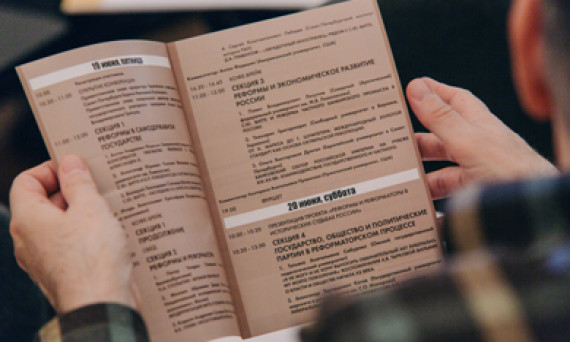On June 19th-20th, the European University at St. Petersburg and the St. Petersburg Institute of History, Russian Academy of Sciences hosted an international conference titled “Issues in Reforming Russia at the Turn of the 19th-20th Centuries: On the 100th Year Anniversary of Sergei Witte’s Death” with support from Goznak. This was the sixth conference within the framework of the program “Reforms and Reformers in the Historical Destinies of Russia”.
On June 19th-20th, the European University at St. Petersburg and the St. Petersburg Institute of History, Russian Academy of Sciences hosted an international conference titled “Issues in Reforming Russia at the Turn of the 19th-20th Centuries: On the 100th Year Anniversary of Sergei Witte’s Death” with support from Goznak. This was the sixth conference within the framework of the program “Reforms and Reformers in the Historical Destinies of Russia”.
The conference was of a distinctly international nature. Participants included 17 presenters from Russia, the United States, Great Britain, Germany, and Finland.
“Goznak” General Director Arkady Trachuk opened the conference with a report on Witte’s contribution to the Expedition for Storing State Papers.
Reforms in an Autoctratic State
The first section was devoted to the particularities of the reform process under conditions of absolute authoritarianism. Presenters noted the importance of transition from analysis and exposition of projects and programs of reforms toward the study of the bureaucratic routine of the modernization process and analysis of symbolic, political and financial resources and competition over them. Professor Igor Khristoforov from Higher School of Economics provided commentaries.
Reforms and Reformers
Presenters raised issues concerning the roles played by Sergei Witte, Pyotr Stolypin and their associates in carrying out the reforms. During the discussion, participants spoke about the necessity of drawing research away from the former figures toward their ideological and technocratic advisors. Also important is the analysis of mental conflicts between two generations of reformers: representatives of the liberal “enlightened” bureaucracy of the 1860s and a new generation of technocrats. This can explain much in the history of the successes and failures of reforms. Professor Anton Fedyashin from American University (United States) was a discutant.
Reforms and Russia’s Economic Development
This section was devoted to the state’s economic program at the turn of the century. Presenters mentioned that at the turn of the 19th-20th centuries, the government was extremely preoccupied with the issue of the public’s trust in their own financial institutions. This was a key moment for the successful implementation of monetary policy. Section commentator Ekaterina Pravilova (Princeton University, United States) drew attention to the fact that in the discussions about state intervention in the economy, the degree of governmental participation is not as important as its role in financial regulation: whether it assumes the function of “banker” or “controller.”
The program for the second day, June 20th, was quite varied.
Mikhail Krom, EUSP Department of History professor, and Ella Saginadze, a Department of History alumna and Organizing Committee member, gave a presentation on the Department of History project titled “Reforms and Reformers in the Historical Destinies of Russia” and the website “Istoria reform [History of Reforms].”
The final day of the conference consisted of two sections:
The State, Society and Political Parties in the Reform Process
In this section, participants discussed various aspects of interaction between the government and society and the role of public opinion in the political process of the “Duma monarchy.” Section commentator, University of Wisconsin-Madison professor David McDonald, noted that a basic problem was the permanent “crisis of confidence”—mistrust between public leaders and the government, and within the government as well—between reformers and their government colleagues. Conference participants refreshed the discussion on the terminology and concepts of “liberalism” and “conservatism” (and even “liberal conservatism”) in the context of the developing public sphere of the late Russian empire.
Reform and the Imperial Factor
Presenters turned their attention to the issue of the influence of factors of nationalism and empire on the process and results of reforms. Reports were given on the specifics of modernization in the Caucasus and constitutional reforms in Finland. On the basis of his analysis of a large statistical data set, Professor D. Darrow presented on the correlation between the intentions and practical implementation of Stolypin’s reforms. Discussions took place regarding two of the most pressing issues of domestic policy of the late empire—national and agrarian—which, according to participants, being unresolved, determined the collapse of the Russian empire. The section commentator was Ben Eklof of Indiana University (United States).
The concluding discussion began with a presentation by Organizing Committee member and professor Francis Wcislo (Vanderbilt University), one of the most renowned foreign specialists on the late Russian empire and author of the latest biography of Sergei Witte in foreign historiography, “Tales of Imperial Russia: The Life and Times of Sergei Witte, 1849-1915” (2011). In his presentation, Wcislo presented Witte as a man of the modern era and a typical Russian man of his class, if we consider these concepts in imperial rather than national categories.
Next, participants discussed the successes and failures of Russia’s socio-economic and political modernization at the turn of epochs, and touched upon the issue of the correlation between reformism and revolutionism. They also raised this issue of technology and the criteria for successful reform. In the course of debates, conference participants divided themselves into two groups: the “optimists,” who believed that the Russian empire had a chance for successful development as the result of reform, and the “pessimists,” who argued that the empire’s modernizing resources were exhausted in the early 20th century. Speakers talked about the need to abandon the value approach—that is, evaluating one or any transformation in terms of good or bad, liberal or conservative—and to move away from the practice of “personifying” processes taking place within the empire in favor of actively studying bureaucratic practice.
Ella Saginadze





























